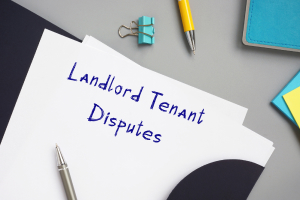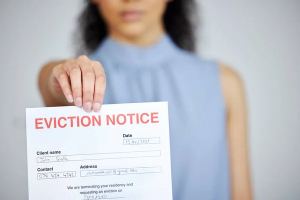
At Halavanau Injury & Accident Law, we have experience with landlord and tenant issues. We specialize in dispute resolution and will fight to resolve landlord-tenant disputes in your favor. This includes handling the tenant's security deposit disputes as well.
Learn more about CA rental real estate law below. Then, make sure to call us if you have a landlord-tenant dispute, such as a problem with the lease or rental agreement for your San Francisco rental property.
San Francisco has city-specific regulations. This includes the Residential Rent Stabilization and Arbitration Ordinance, which controls rent increases and evictions for certain rental units. This also includes laws that could prevent a security deposit dispute. Familiarizing oneself with these local ordinances is crucial for both landlords and tenants.

Disputes can arise from various issues. The most common landlord-tenant issues include:
These issues underscore the importance of clear communication and understanding legal obligations.
A. Overview of Tenant Rights in San Francisco
Every tenant in San Francisco has the right to a habitable living space. This means properties must be safe, with functional utilities, and free from pests. Some landlords have a property management company that is supposed to handle upkeep and maintenance. Tenants also have protections against unlawful evictions. Furthermore, San Francisco's rent control provides additional tenant rights, ensuring they aren't subject to abrupt or excessive rent hikes.
B. Explanation of Landlord Responsibilities Under Local Laws
Landlords have a duty to provide a safe and clean environment. They are responsible for necessary repairs, including plumbing, heating, and structural issues. They cannot evict tenants without just cause, especially in rent-controlled units. Furthermore, landlords must follow specific protocols if they decide to raise the rent.
C. Importance of Reading and Understanding the Lease Agreement
Leases are binding contracts that detail both parties' rights and obligations. They should clarify terms like rent, deposit, and maintenance responsibilities. Every tenant should read and understand their lease before signing. Asking questions and getting clarification can prevent future disputes.

A. The Significance of Open and Clear Communication
Open dialogue is key to a smooth landlord-tenant relationship. Both parties should be approachable and willing to discuss concerns. Clear communication can prevent misunderstandings, leading to fewer disputes.
B. Strategies for Addressing Concerns and Issues With Your Landlord or Tenant
Actively listening is crucial. Address concerns promptly and consider the other party's viewpoint. Setting regular check-ins can also be beneficial to ensure both parties are on the same page.
C. Importance of Documenting All Communication
Keep a record of all correspondence. Documentation provides a clear history, whether it's about repairs, rent increases, or any other issues. This can be crucial if a dispute arises and can provide evidence in legal scenarios.
Regular upkeep is essential to maintain a rental property's value and ensure tenant safety. Landlords must address critical repairs promptly. Meanwhile, tenants have a role in reporting issues and maintaining the property's cleanliness.
Tenants should keep their living space clean and tidy. They should promptly report any damages or issues to the landlord. While wear and tear are natural, tenants must avoid causing excessive damage. Proper use of appliances and fixtures is crucial. The resident must also not cause intentional harm.
Landlords have a duty to provide a safe, habitable environment. This means addressing any structural issues, leaks, or utility problems promptly. Regular inspections can aid in identifying potential problems early on. Landlords should also be responsive when tenants report issues.
When a problem arises, tenants should report it immediately. It's helpful to provide a detailed description and, if possible, photos. This gives landlords a clear picture of the issue. This helps track how promptly issues are addressed. If disputes arise, having detailed records can be invaluable.

A. Importance of Paying Rent on Time
Rent is the foundation of the landlord-tenant relationship. Paying on time ensures trust and reduces the risk of disputes. Late payments can result in penalties, and consistent delays can lead to eviction.
B. Options for Rent Payment Methods
Many landlords offer multiple payment methods, from checks to online portals. It's essential to understand the preferred method and use it consistently. Some methods may offer conveniences, like automatic payments, reducing the risk of late payments. It is important to keep documentary proof of payments.
C. Dealing With Rent Increases and Rent Control Regulations
San Francisco has specific rules about rent increases, especially for rent-controlled units. Tenants should familiarize themselves with these rules. If a landlord proposes an increase, it should comply with local regulations. Being informed can help tenants address unlawful hikes.
A. Understanding Security Deposit Regulations in San Francisco
Security deposits are commonplace in rental agreements. They protect landlords against unpaid rent or property damage. However, San Francisco has specific regulations about the amount and return of these deposits.
B. Guidelines for Returning Security Deposits
Landlords must give back security deposits within 21 days of a tenant moving out. If deductions are made, they should provide an itemized statement. Understanding this timeline and the reasons for deductions can prevent disputes.
C. Documenting the Condition of the Rental Unit Upon Move-in and Move-Out
Both parties should document the property's condition at move-in and move-out. Photos can provide a clear record. This ensures fair deductions from the security deposit and reduces potential conflicts.

A. Overview of Local Tenant Associations and Legal Aid Services
San Francisco boasts several tenant associations and legal aid services. These organizations can provide guidance, resources, and even legal assistance in disputes. Being aware of these resources can empower tenants and landlords alike. Reaching out to the San Francisco Rent Board is a good first step in exploring your resources.
B. The Role of Mediation in Resolving Disputes
Mediation offers a neutral ground for resolving disputes without resorting to court action. Both parties can voice their concerns through a mediator and find common ground. Opting for mediation can save time, money, and stress for both landlords and tenants.
C. How to File a Complaint With Relevant Authorities if Necessary
If disputes can't be resolved privately, there are official channels. In San Francisco, the Rent Board handles many landlord-tenant issues. Depending on the issue, a tenant can also file a complaint with the Building Department or health agency. If you believe your rights are violated, filing a complaint with the appropriate agency is a valid step. Finally, the tenant may file a lawsuit to enforce his rights. Ensure you have documentation to support your claims.
A. Explanation of Fair Housing Laws in San Francisco
Fair Housing Laws ensure that all tenants have equal access to housing, regardless of race, gender, disability, and other protected categories. In San Francisco, these laws are strictly enforced to ensure an inclusive community for everyone.
B. Recognizing and Addressing Discrimination or Harassment
Discrimination and harassment can manifest in many forms, from unjustified evictions to unfair rent hikes. Being aware of your rights is essential. If you suspect discrimination, document all interactions and consider seeking legal advice.
C. How To Report Violations of Fair Housing Laws
If you believe you've faced discrimination, San Francisco's Human Rights Commission can help. An attorney can also give you advice regarding your rights against discrimination. They handle violations of Fair Housing Laws and can offer guidance on the next steps. Always ensure you have evidence to back up your claims.

A. Understanding Lease Termination Notice Requirements
Both landlords and tenants have specific obligations when terminating a lease. Generally, a 30-day notice is required, but specific terms can vary. It's crucial to understand your lease agreement and adhere to its stipulations.
B. The Eviction Process in San Francisco
Evictions must follow strict legal procedures. Landlords cannot forcibly remove a tenant without adhering to the process. Familiarizing yourself with these rules can protect your rights, whether you're a landlord or tenant.
C. How To Respond to an Eviction Notice
If you receive an eviction notice, it's vital not to panic. First, ensure the eviction notice follows local guidelines and seek legal counsel or advice from tenant associations.
A. Importance of Renters' Insurance for Tenants
Renters' insurance protects tenants from personal property loss, liability, and sometimes even additional living expenses. While not always mandatory, it's a layer of protection that every tenant should consider.
B. Benefits of Landlord Insurance for Property Owners
Landlord insurance can cover property damage, lost rental income, and liability. It ensures that property owners are not left in a financial lurch due to unforeseen incidents.
C. How Insurance Can Protect Both Parties in the Event of Unforeseen Circumstances
Insurance acts as a safety net. Whether it's a fire, theft, or an accident, having the right insurance can mitigate financial and legal repercussions for both landlords and tenants.
A. Tips for Tenants on Maintaining the Rental Unit
Regular cleaning, avoiding harsh chemicals on surfaces, and prompt reporting of issues can extend the life of a rental unit. Simple habits like removing trash regularly can prevent larger issues like pest infestations.
B. Advice for Landlords on Maintaining the Property
Routine inspections, addressing minor issues before they escalate, and open communication with tenants can ensure the property remains in top condition. Landlords should also be proactive in checking safety devices like smoke alarms.
C. How Regular Inspections Can Prevent Disputes
Periodic checks by both parties can identify potential issues early. This proactive approach means small problems are addressed before becoming major disputes.

Knowing local rental laws is crucial if you are dealing with a landlord-tenant dispute and issues with your lease agreement. At Halavanau Injury and Accident Law, we have experience in handling landlord-tenant issues. We would be honored to review your case as well.
Contact us today to schedule a case consultation!
Schedule Your
Free Consultation
Request Your Free
Confidential Consultation